Community
Community advocate makes run for state house
Published
2 years agoon
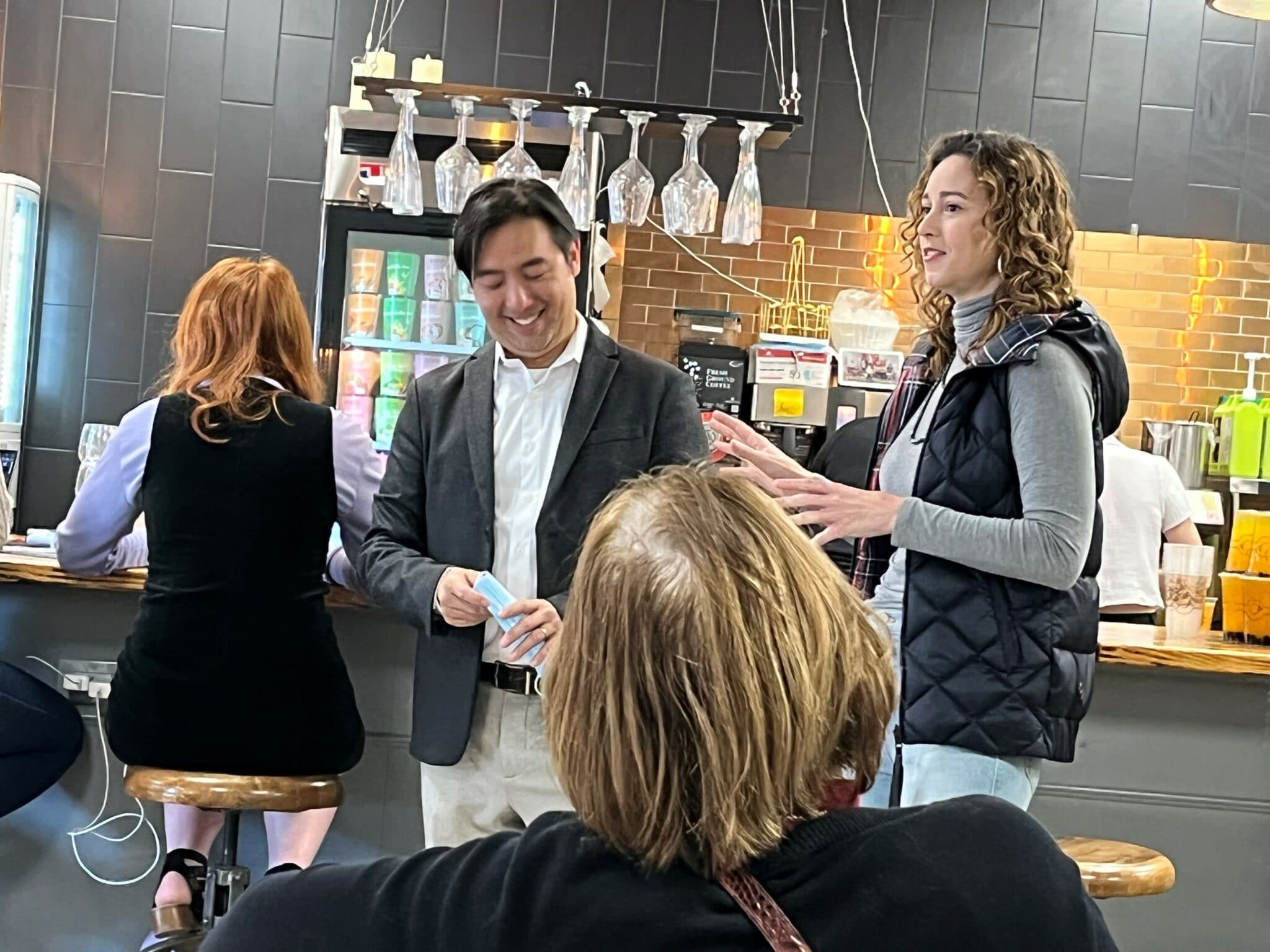
Peachtree Corners Business Owner Seeks House Seat
The route to seeking political office may have been long, but the desire to serve the community has always been a part of Long Tran’s DNA. He’s seeking Georgia House of Representatives District 80, which used to be District 79 until a new map was drawn. It doesn’t include Peachtree Corners but borders it. He is a local businessman — the owner of Peachy Corners Café and a fixture in the community for more than two years. A child of Vietnamese immigrants, Tran says he’s just as American as those who founded this country, with the same goals of uniting the nation and the community. He recently spoke to Peachtree Corners Magazine about his run for office.
Despite his youthful appearance, Tran will be turning 46 in May. He’s married with two sons, 14 and 10, and credits his wife’s career with his move from Columbus, Ohio to metro Atlanta. A certified public accountant, her Ohio-based firm merged with one here, necessitating a location change.
“My background is actually in IT network security. I was doing that for a little less than 20 years,” said Tran. The family moved to Georgia in 2010 right around the time of the recession when work in his field began drying up. Staying ahead of the trends, Tran switched to mobile app development.
“This was when the iPhone 3G came out. On the iPhone App Store at that time, there were maybe 40 or 50 apps versus the hundreds of 1000s of apps available now,” he said.
Doing that part time, Tran focused on being a Mr. Mom, of sorts, with most of his time spent taking care of the couple’s first-born son.

Creating family-friendly space
As any modern parent can attest, it’s not easy to find a spot to hang out in between their child’s extracurricular activities.
“One day, I was sitting at my son’s karate class and sometimes the chronic schedule means your older son goes at, say, four o’clock. And then he’s done at five, and maybe your youngest son doesn’t have his class until seven, or six. And so, you’ve got a one-hour gap, but you don’t want to go home because as soon as you get home, you have to come back. And there wasn’t really a good place to go hang out that had the fast Wi Fi we all need,” said Tran. “So, I drove around and saw the location we’re in now and thought it would be really cool for a local, independently-owned coffee shop and started the process.”
About a month in, the pandemic hit. Since the place wasn’t really conducive to pick-up or delivery service or even social distancing, Tran shut down the café four days before the governor’s mandate. With a surplus of supplies and a pipeline to obtain more, he began distributing sanitizer, toilet paper and other non-perishable items to hospitals and front-line workers as well as coffee and bubble tea that had a long shelf life but would have diminished freshness after a few months.
From that altruistic act, a loyal customer base began to grow.
“People started calling us and messaging us asking, ‘Hey, I have a friend or brother or sister that’s a doctor at this hospital, they could use what you sent to the other hospital. Can we make a donation to you to send drinks there?” Tran said. “We used that money to source extra masks and gloves and supplies that we took to the hospitals, in addition to the drinks that we were bringing. And that got us through the worst part of the pandemic. And as soon as the governor loosened restrictions, we started opening our doors.”
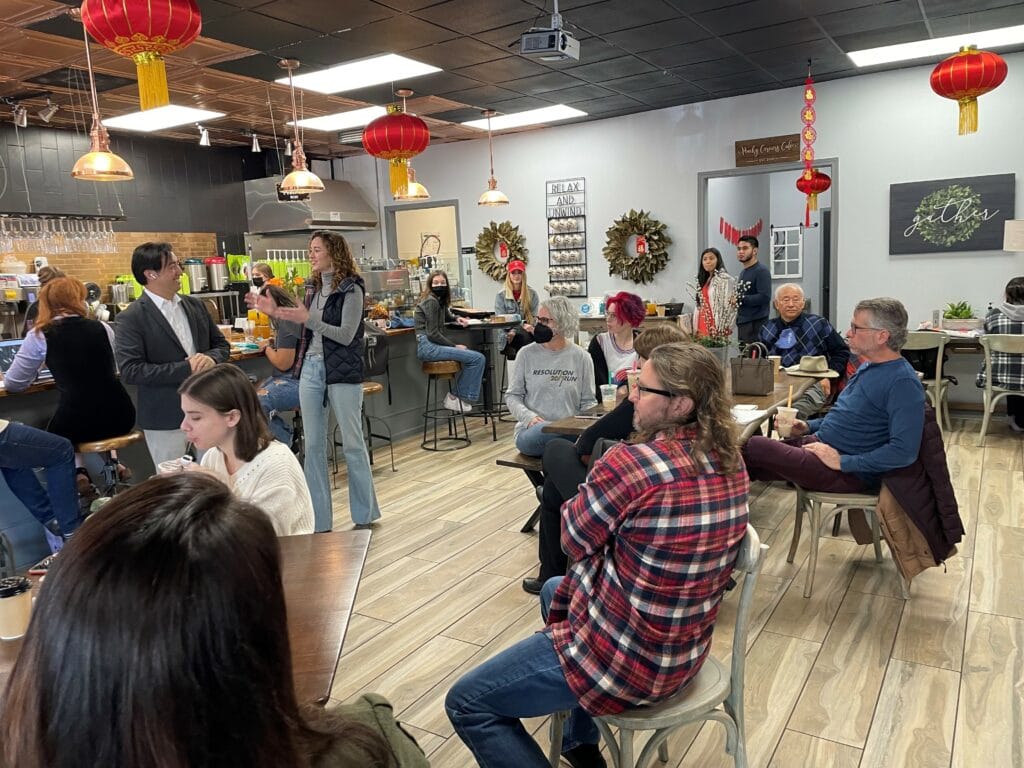
Growing community advocacy
Another consequence of the pandemic was the attacks on people of Asian descent.
“People were attacking Asian Americans, blaming us for COVID,” said Tran. “It was happening in New York, Chicago, San Francisco, but not here, and the Asian community felt insulated until the attacks on the spa workers in Cherokee County and Atlanta in March 2021.”
Prior to that Tran discovered the Asian community wasn’t very engaged and hadn’t been as diligent about voter registration and other events to exercise citizen rights.
“I started reaching out to my friends that were Asian American and the Asian-American nonprofits — the Vietnamese, Korean, Chinese, Japanese communities working together to get voter registrations and people out to vote. There were some groups, but there wasn’t a big movement,” Tran said.
He began working with Asian Americans Advancing Justice to push voter registration, but also ensuring that the community was heard and that they were given facts instead of lies that people were spreading about Stacey Abrams and her campaign.
“We kicked things into overdrive in 2020. Asian American voters in Georgia increased by more than half, I believe,” he said.
According to Asian American Advocacy Fund data, there are more than 300,000 registered voters in Georgia who identify as Asian American or Pacific Islander. More than 185,000 voted in 2020. That’s about a 63% increase compared to 2016. Although Asians make up about 4% of the population in the state, it’s the fastest growing demographic, nearly doubling from a decade ago, according to U.S. Census data.

Government for all people
But Tran isn’t looking to just strengthen Asian-American presence in state government. He recognizes the importance of diversity and wants to make sure everyone’s point of view is represented.
“February 1, the start of Chinese New Year, I made the announcement that I’m going to run for state representative of House District 80,” he said. “I’m seeing a lot of support across the board. The first endorsement I can talk about is Beth Moore, a state representative of House District 95, which includes where my store is located, and she was among the first people to reach out to me and encouraged me to run for the new district.”

Tran has reached out to the Jewish community and the Hispanic community. He’s contacted labor organizations and religious leaders. An unofficial announcement party on Super Bowl Sunday brought a lot of people to his café that he didn’t realize were behind him.
“I was expecting about 20 people tops and we had more like 70,” he said. “I’m hoping my campaign is a representation of the broad diversity we have, not only in our district, but actually, in Georgia. In Atlanta. We’re very diverse. And I want people to see my campaign as one where everyone can truly work together, truly get along, even the more conservative Republicans.”
His platform is looking at ways to make public education more efficient, moving toward a livable minimum wage statewide, finding a way to work with undocumented immigrants for a legal status that includes citizenship or something else, and more ways to sustain small business, especially when a crisis like the COVID pandemic hits.
“The relief for small businesses was slow coming. A lot of business owners were forced to close and find other jobs. They weren’t able to get unemployment right away. They suffered greatly,” said Tran.
Although, if he’s successful, his district will be in DeKalb County, Tran wants his Gwinnett County neighbors to know that he’ll represent the entire state.
“I’ve formed friendships with the elected officials in DeKalb, but I’ve also formed friendships with elected officials in Gwinnett, as well. If I’m lucky enough to make it to the statehouse, I’ve got people I can collaborate with and work with to fix issues that affect both counties and the state as a whole. And I think that is an important skill and ability that’s required because you’re not going into the gold dome alone and just yelling, trying to make people do what you want. It’s a collaboration, a teamwork, and I’m looking forward to working with the elected officials everywhere.”
About GA House District 80 (formerly House District 79)
- On Dec. 30, Gov. Brian Kemp signed Georgia’s congressional map into law. This map takes effect for Georgia’s 2022 state legislative elections. So, there will be some shifting of representation after November.
- It is currently represented by Michael Wilensky (D).
- The population is 60,655 which consists of 51.1% white, 17.1% Hispanic, 16.5% Asian, 13.3% Black and 0.9% Native American.
- As of the 2020 Census, Georgia state representatives represented an average of 59,510 residents each.
- The general election will occur on November 8, 2022.
Related
Arlinda Smith Broady is part of the Boomerang Generation of Blacks that moved back to the South after their ancestors moved North. With approximately three decades of journalism experience (she doesn't look it), she's worked in tiny, minority-based newsrooms to major metropolitans. At every endeavor she brings professionalism, passion, pluck, and the desire to spread the news to the people.

Community
Peachtree Corners Shines Bright with Light Up the Corners Glow Race this August
Published
2 days agoon
July 24, 2024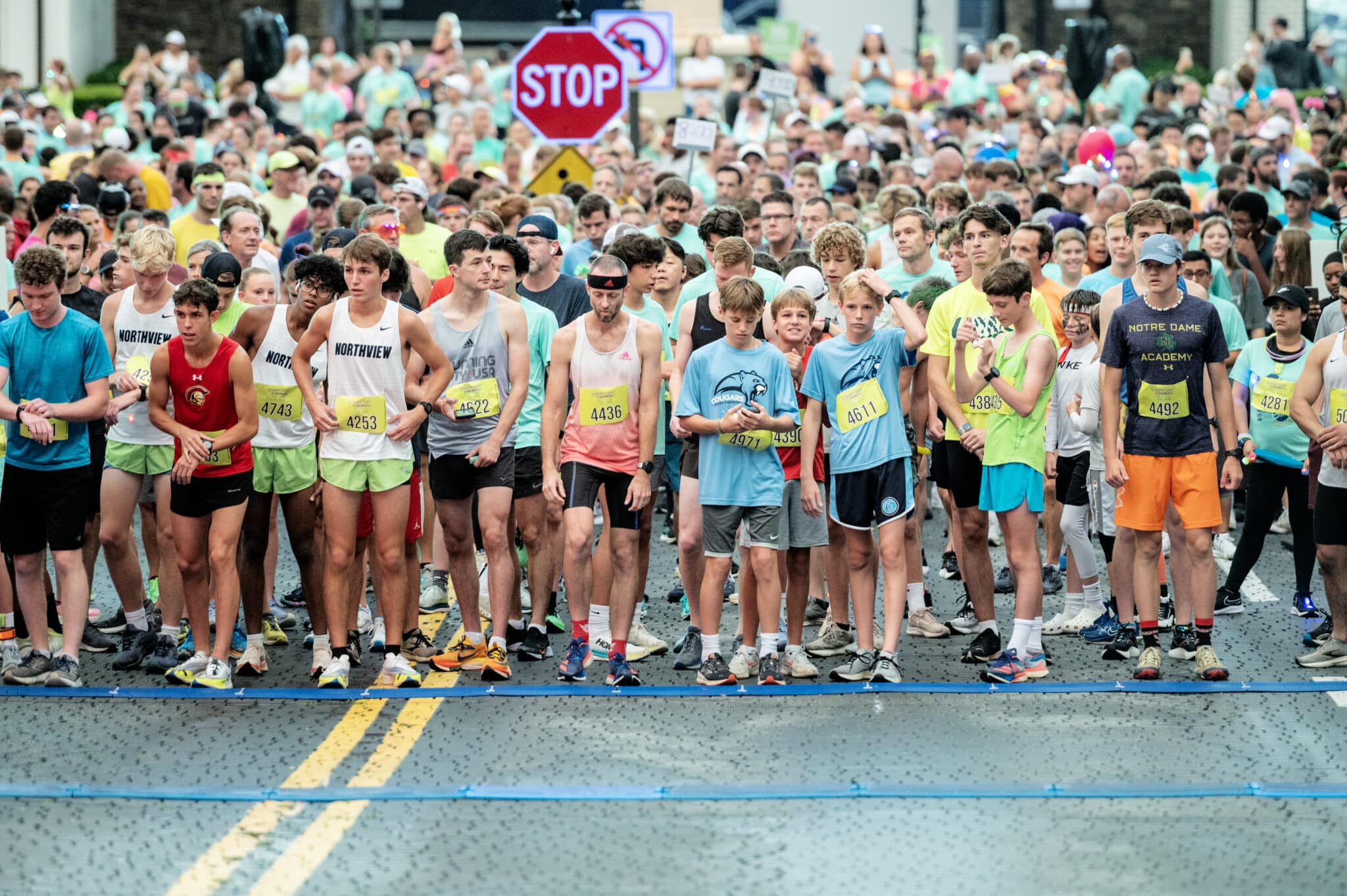
Peachtree Corners’ annual Light Up the Corners Twilight Trot and Glow Race is returning to the Forum on Aug. 10 for its 13th year of building community, getting some exercise and benefitting a very worthy cause.
Amy Massey, the founder of Light Up the Corners, said her inspiration for the nonprofit came from serving on the board of the Fowler YMCA for 10 years.
“I was always looking for ways to raise money for [Fowler YMCA’s] annual campaign. And I rotated off about 12 years ago or 13 years ago. At that time, I was looking for ways to raise money, and the City of Peachtree Corners was talking about becoming a city through UPCCA,” she explained.
“I’m a runner and I was a member of the Y, and we had a running group out of the Y. So, I just recruited some of my running friends and decided we would start a race in Peachtree Corners,” Massey added.
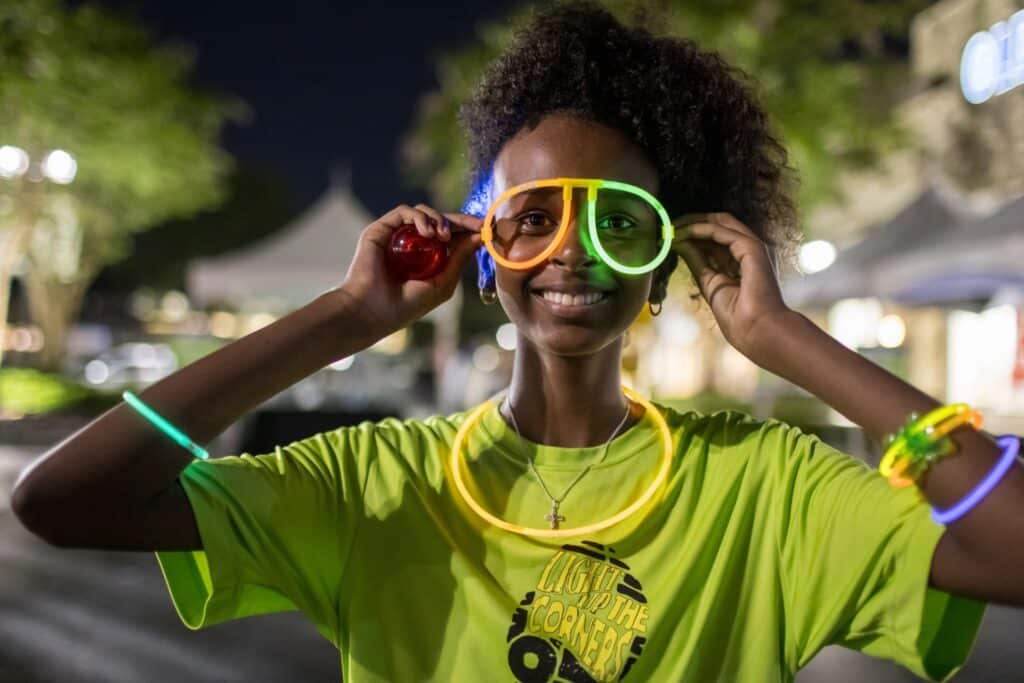
Bigger and better
In its first year, the race had roughly 400 participants. Not a bad turnout for the inaugural event, but Massey and her team of volunteers quickly started brainstorming on how to attract more runners.
“We talked about doing a glow run, and that’s when it changed. So, in year two, we did our first glow run. This year will be our 11th annual glow run and our 12th run altogether. And then we took one year off during COVID,” said Massey.
It’s my baby,” she added. “But I could not do it without the help of my friends and running partners who have been with me all the way. We have some of the same volunteers on our committee now as we did when we started out.”
This year, Light Up the Corners expects over 1,500 attendees.
“There are a lot of glow runs out there that are more of adult-focused parties. But ours truly is a coming together of people of all ages and all walks of life,” said Massey.
“That’s what sets us apart because our largest demographic in terms of age groups is the 10 to 19 range. A lot of school-age kids come out, a lot of young kids with their parents. We have 300 little kids who sign up for the Twilight Trot, which is just half a mile long. And so that attracts the little ones. It’s heartwarming to see people of all ages come together and it’s a healthy fitness-focused, family-friendly community activity,” she added.
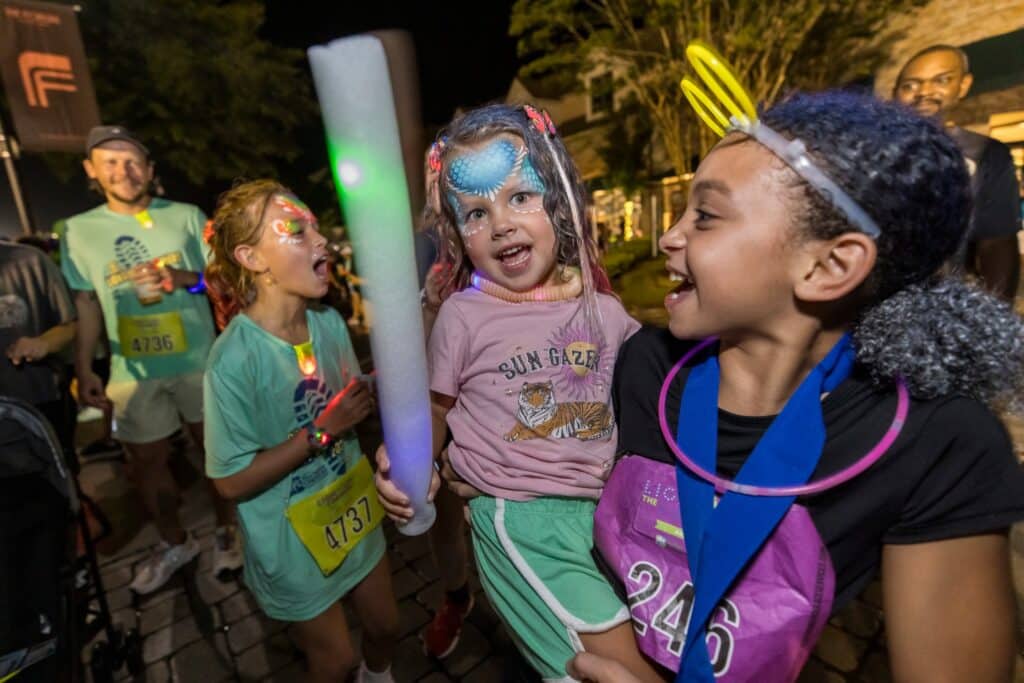
A big, family-friendly party
In addition to two races: a Twilight Trot 1K for the kids, and a 4-mile Glow Race for the adults, the Forum will be showcasing its new plazas. The pre-party and Glow after party will be held on the Grand Plaza which is set to open on that very weekend.
“Each participant gets a lot of glow swag, we want to make sure everybody lights up the course as they’re running around Peachtree Corners, and also to keep them safe so everyone gets that and a glow baton,” explained Massey.
“We welcome runners, walkers and people of all ages. It is more about the fun and the excitement of coming together as a community than it is about racing or setting any speed records,” she added.
The Forum has also hired Yvonne Monet, a radio personality and DJ with Q99.7, to entertain eventgoers and keep the energy up with great music. There will also be face painting and neon fingernail painting, along with roaming entertainers on roller skates and more, courtesy of the Forum.
On top of that, race sponsors will be providing food and samples throughout the night, like pizza, watermelon and a wide variety of other tastings from The Forum restaurants.
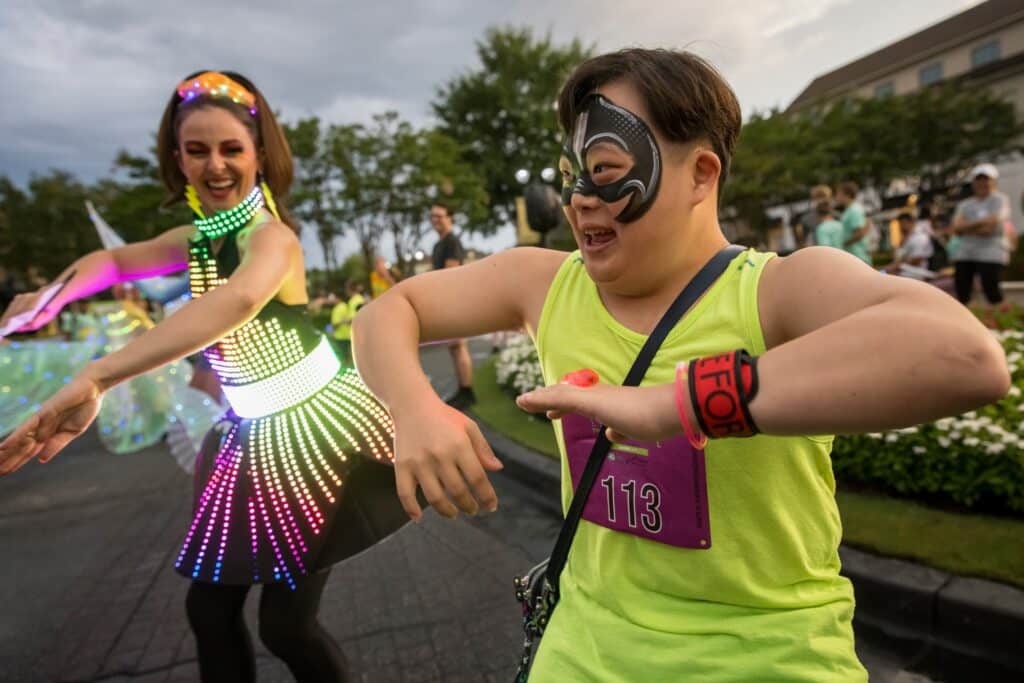
Coming together for a worthwhile cause
Light Up the Corners is an IRS-recognized 501(c)(3) nonprofit run entirely by volunteers. There are no paid positions at all, and 100% of proceeds go to the Why it Matters Campaign at the Fowler Y.
“All money stays local, and it is a passion of our committee to help the Y through this campaign. We believe that all people, regardless of their ability to pay, deserve to benefit from the programs and services at the YMCA. And they have a sliding scale that they use to provide financial assistance to people,” said Massey.
“There’s a wide range of programs and services, and I’ve seen firsthand the work that they do there and the life-changing effects that it has had on so many people in our community,” she added.
Sponsors are also fundamental to the event’s success.
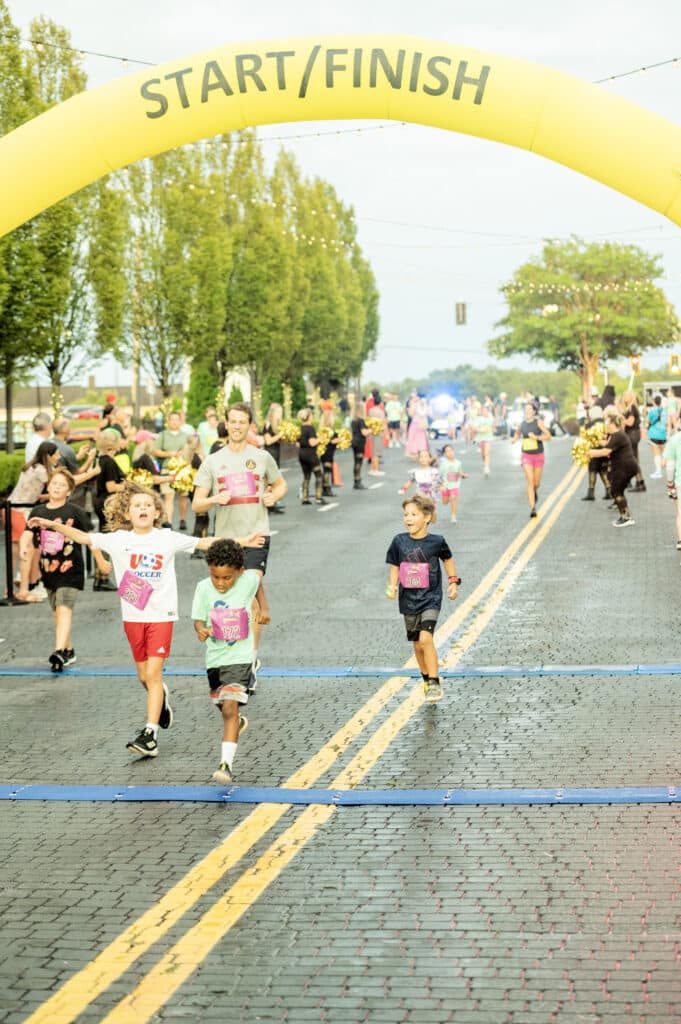
Without the support of sponsorships and generous donations, there would likely not even be a race because the associated costs would cancel out the registration fees, explained Massey. Sponsors allow Light Up the Corners to offset all costs of the event so that 100% of registration fees by individuals go directly to the YMCA.
“I will say that North American Properties, when acquired The Forum, have gotten behind this event 110%. They have been amazing in their support and generosity in providing the tents, the entertainment and the backbreaking work of setting up something like this,” said Massey. “We couldn’t do it without them or the City of Peachtree Corners which has been a title sponsor since day one.”
Fun fact: For the first time, Light Up the Corners held an open competition to see who in the community could design the best t-shirt logo for this year’s race. Daniel Lee was chosen out of over 30 submissions and was awarded $1,000 for his efforts.
To participate in the annual Light Up the Corners Glow Run, register at lightupthecorners.com or simply line up on the racecourse and cheer the runners on as a spectator. To become one of over 200 volunteers, email Amy Massey at amassey@runthecorners.com.
Related
Community
Twin Authors Chronicle Antics of ‘Four-Legged Brother’
Published
2 months agoon
June 6, 2024
Berkeley Lake second graders make fans across the globe with sweet children’s story.
When rescue dog Apollo found his forever home with Megan and Mackenzie Grant, the Berkeley Lake twins knew they had added a special member to the family. He’s so beloved that he’s considered their “four-legged brother.”
Apollo is a Boston terrier. The breed is known for its friendliness and love of people and children. According to the Purina Company, makers of all kinds of pet food, Boston terriers make affectionate pets and are outgoing and social.
While they are called ‘terriers,’ they are not in the terrier group, nor do they behave like them. They are far happier at home with their owner than getting into the usual mischief.
But Megan and Mackenzie see him as a silly addition to the family.
“He’s super cool because he’s always up for fun and loves us a whole bunch. And guess what? We love him back even more! He’s like the best friend ever, wagging his tail and making everything awesome!” they said in a press release.
Apollo’s birthday inspiration
As his first birthday approached, the girls, six years old at the time, wanted his day to be special.
“I said, ‘Well if you want to come up with something to do, let’s write it out,’” said mom Tameka Womack. “So they started writing out all these different adventures, and it was so cute.”
Megan recalled that their teacher had told them about someone who had published a book, and she asked if they could, too.
“When I read through it, they had all the different things, like playing dress up because we had bought some clothes for him. And we take them out for long walks around the lake and stuff,” Womack added.
Although their favorite subjects in school are PE and art, they did such a good job with the tale that Tameka worked with them to get it published. On Feb. 1, the young authors released the children’s book, “How We Love Our Four-Legged Brother.”
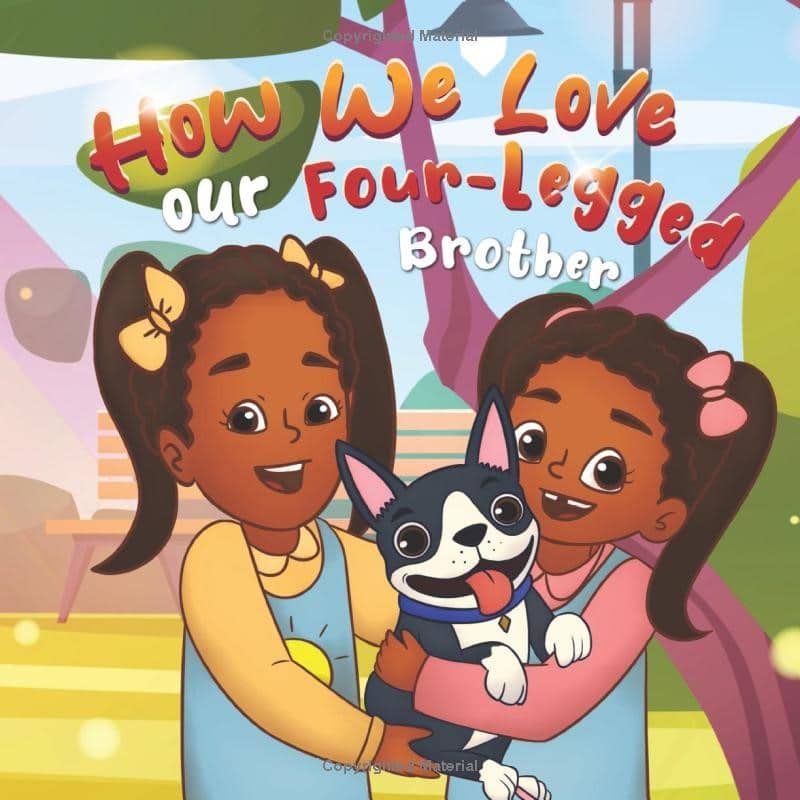
Publishing success
The 30-page book took off almost immediately. Available for print and digital through Amazon and print editions through Barnes & Noble, the book has reached customers in the U.K., Germany, France, Japan, Canada, Australia, Sweden, the Netherlands, Italy, Poland and throughout the U.S.
The girls and their mom were so pleased and surprised to find out the book was No. 1 in its category on Amazon.
“They were just so excited that people actually bought the book,” said Womack. “They were just like, ‘Wow, who is buying this?’”
Feedback from fellow twins, animal lovers and teachers showed that the story resonated on many levels.
“As an educator, I am always on the lookout for diverse and inclusive literature for my students. ‘How We Love Our Four-Legged Brother’ not only captivated the imaginations of the children in my class but also served as a wonderful conversation starter about friendship, empathy and the beauty of diversity,” wrote Ashleigh Darby.
The royalties from book sales are tucked away, with a percentage going to Apollo’s wardrobe.
“He won’t go out in the rain without his raincoat … or out in the winter without his sweater,” said Womack. “We have a little budget for his clothes because every time the girls see something, they’re like, ‘Oh, I think Apollo will like it.’ I’m like, I think he would too, but let’s let it stay in the store.”
Nurturing creativity
Although both mom and dad are engineers and kind of hoped that the twins would follow in their footsteps, Womack said she’s okay with them being artistic and creative.
“Writing is teaching them some responsibility and teaching them a little bit about money,” she said. “Now they want to write a book every day.”
Between raising three daughters (the twins have an older teenage sister), running a household with her husband and keeping up with her career at Georgia Tech, Womack said she’ll look for time to continue helping the girls with their dreams.
“With summer coming up, I would definitely encourage parents to help their children explore their creativity in any kind of way, from digging holes in the ground to … seeing the world … to creating books instead of being on the internet,” said Womack. I try to limit my kids’ screen time … and build real memories.”
Find “How We Love Our Four-Legged Brother” on Amazon.
Related
Community
Local State Reps Give Roundup of Legislative Session
Published
2 months agoon
May 28, 2024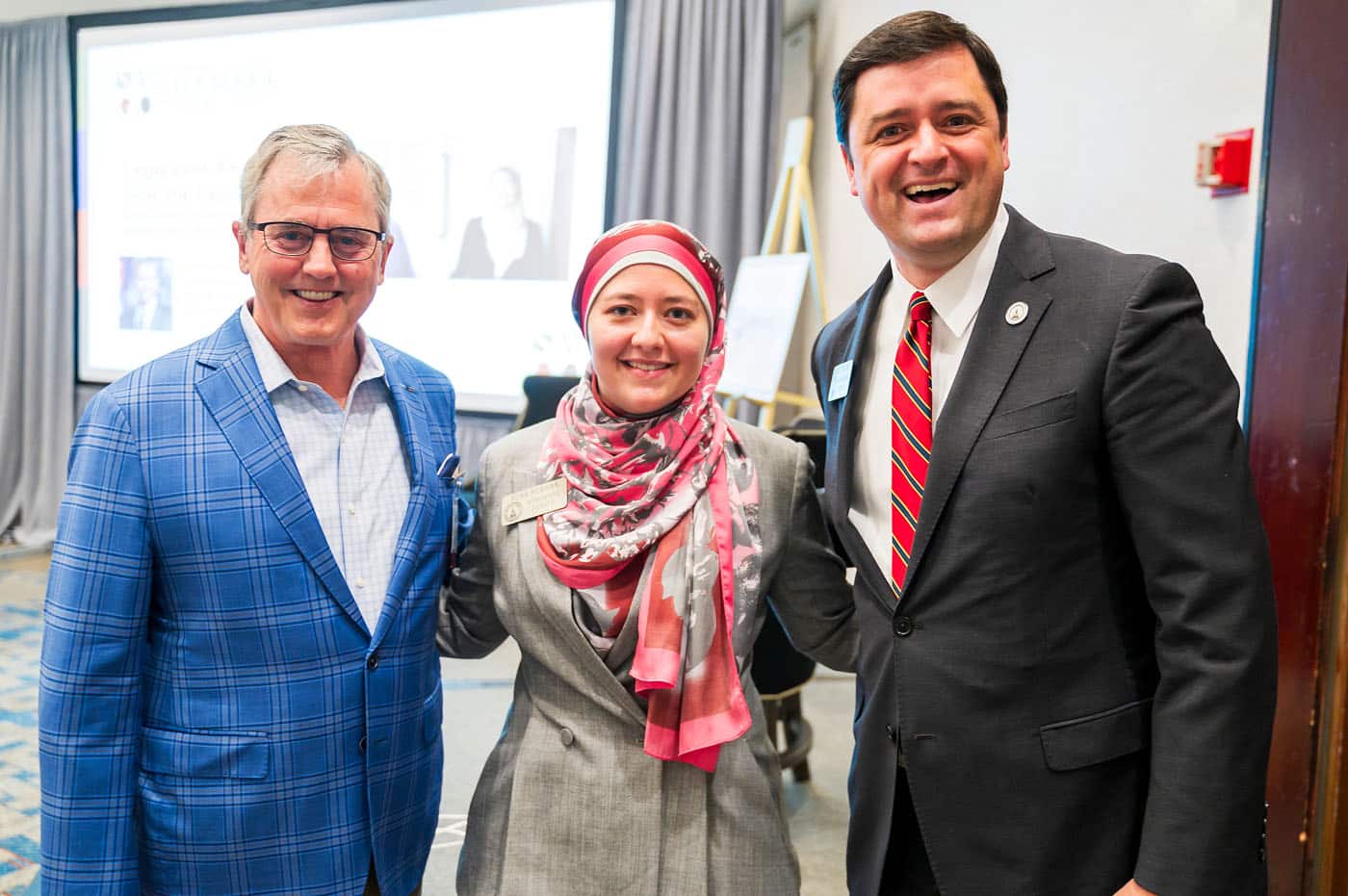
Hilton, Romman trade friendly banter that reflects diverse views in Georgia government
Georgia State House District 97 Representative Ruwa Romman and District 48 Representative Scott Hilton, whose constituents include parts of Southwest Gwinnett County, including Peachtree Corners, sat down for a second time to share information about legislative action at the State Capital.
Their discussion was part of the Southwest Gwinnett Chamber of Commerce First Friday Breakfast series at Atlanta Hilton Northeast.
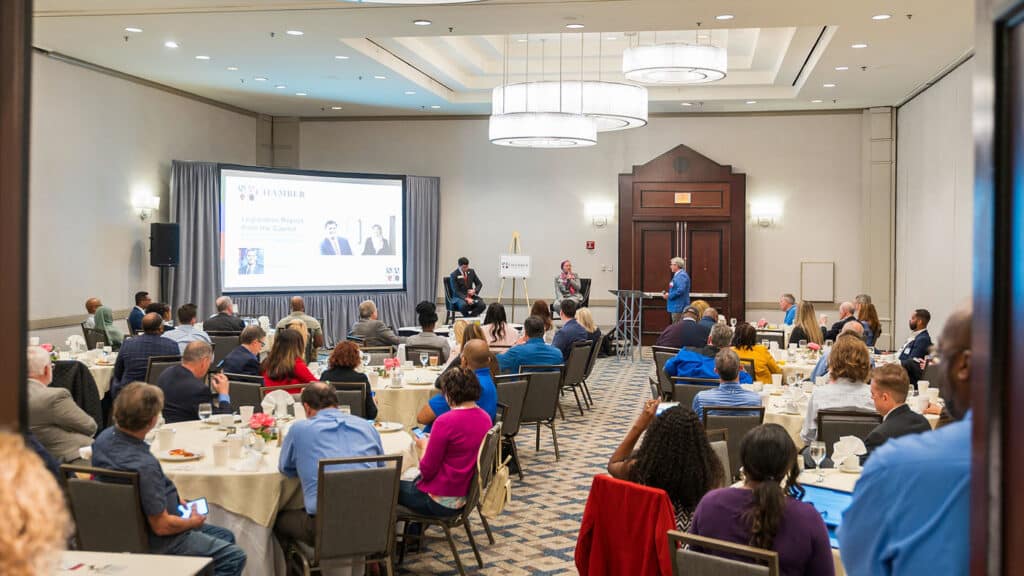
Although they sit on opposite sides of the aisle, Hilton and Romman both seek to sponsor and pass legislation that improves and maintains a high quality of life in the Peach State and provides its residents with what they need.
Elected in 2022, this was Romman’s sophomore year in the State House. She serves on the Georgia House Energy, Utilities and Telecommunications Committee, Georgia House Information and Audits Committee and Georgia House Interstate Cooperation Committee.
Hilton previously served in the State House from 2017 to 2019 but took a “sabbatical,” as he calls it, to serve as executive director for the Georgians First Commission under the Office of Governor Brian Kemp.
He was re-elected to his current position in 2022. He is the vice chair of the Georgia House Creative Arts and Entertainment Committee and the Georgia House Education Committee, as well as a member of the Georgia House Public Health Committee and the Committee on Georgia House Urban Affairs.
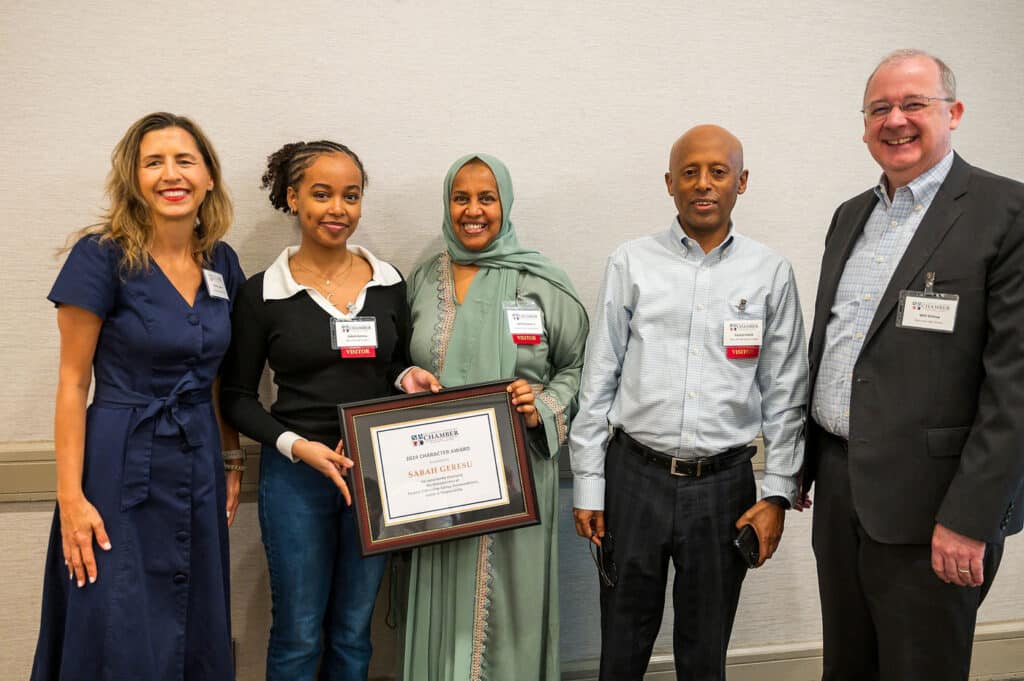
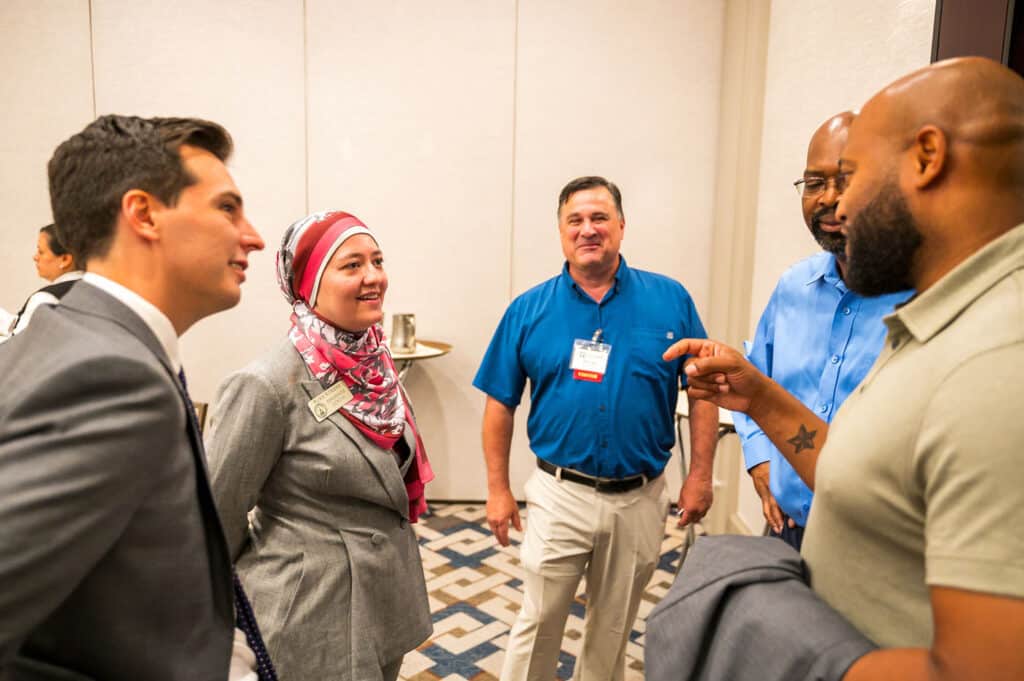
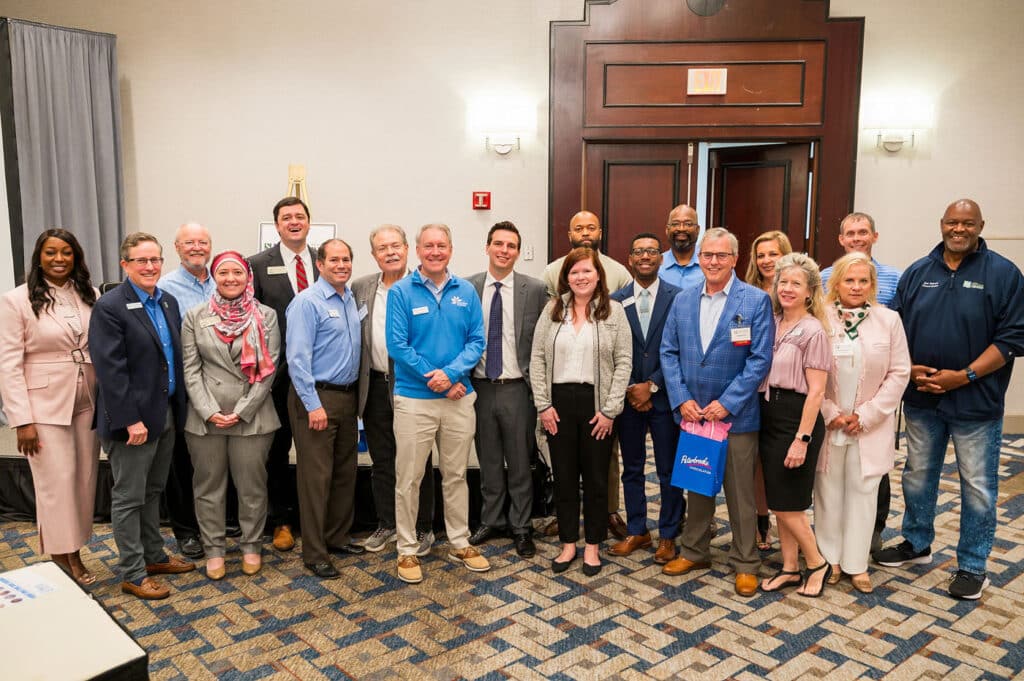
Senate Bill 63
The moderator, Norcross resident and former WAGA political reporter Dale Russell started off with a topic making headlines: Senate Bill 63. This law, signed by Gov. Kemp shortly after the session ended, prohibits charities, individuals or groups from providing bail funds for more than three people per year unless they register as bonding agencies. It also expands mandatory cash bail to 30 new offenses.
“I think it’s going to bring home safety to the community,” said Hilton. “I ran on that issue because as I was knocking on doors, I’ve heard from folks who [want to] keep our community safe. And unfortunately, no community has been immune from the uptick in crime that we had seen post-COVID, so this was one of those bills in response to that.”
Hilton gave examples of crimes where individuals out on bail committed acts such as murder.
“That was our commitment back to our constituents to say, ‘Listen, we’re not going to let bad guys back out onto the streets again to do more crime.’ This bill was in response to this; it’s going to keep our community safe, hold those accountable and bring justice to those who break the law,” Hilton remarked.
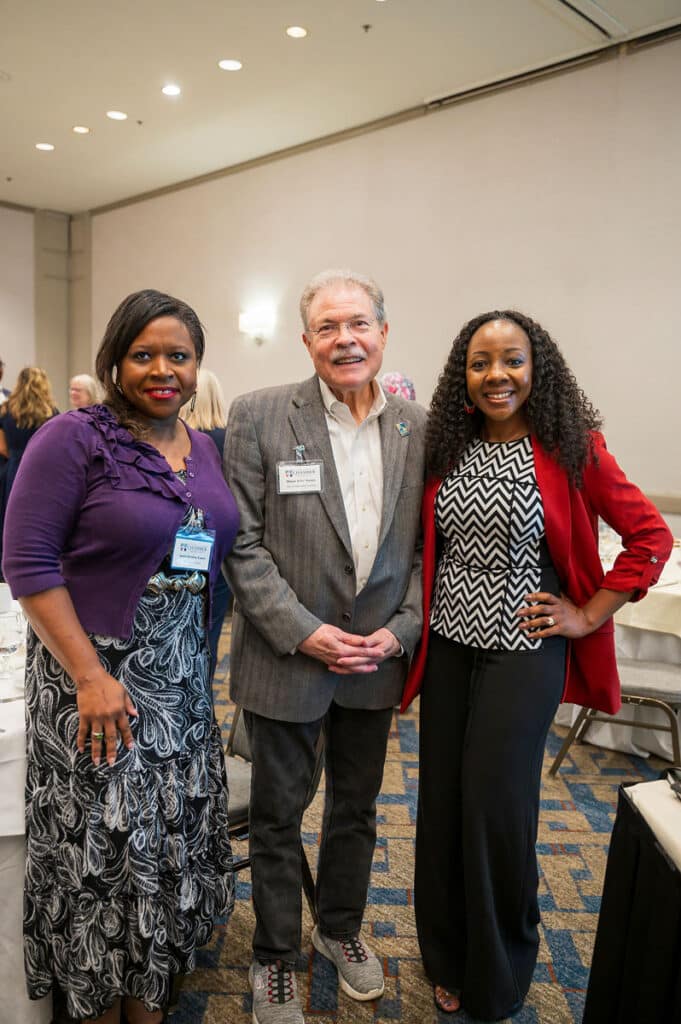
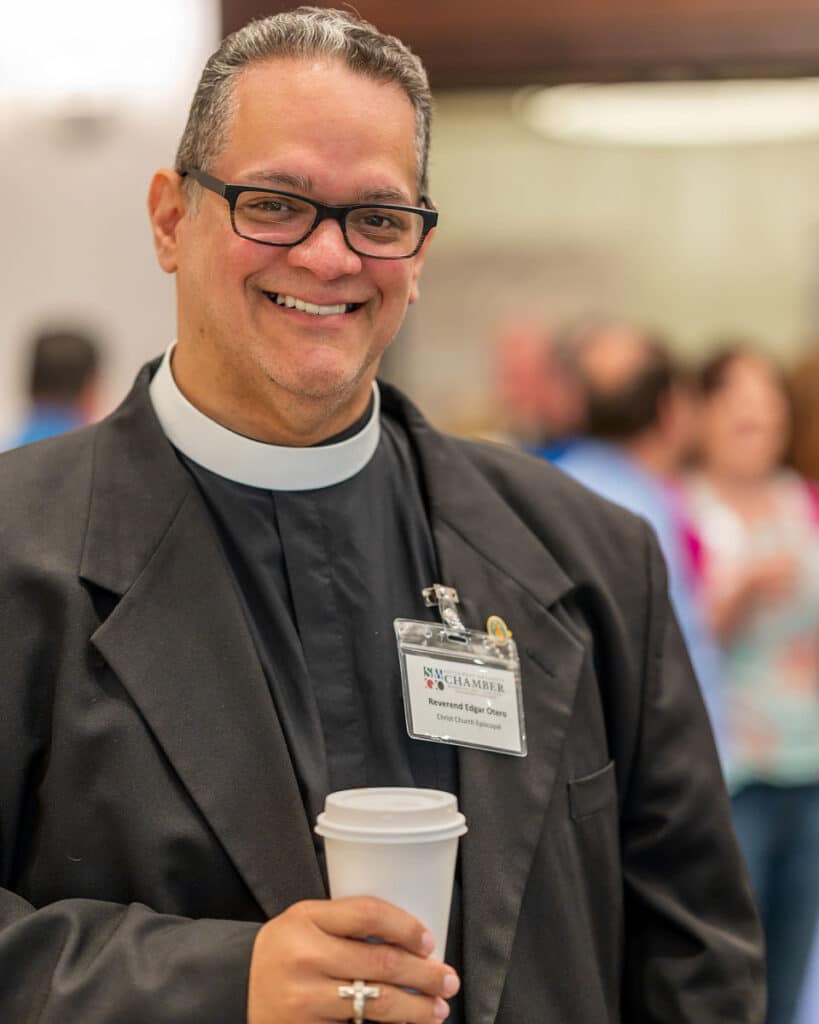
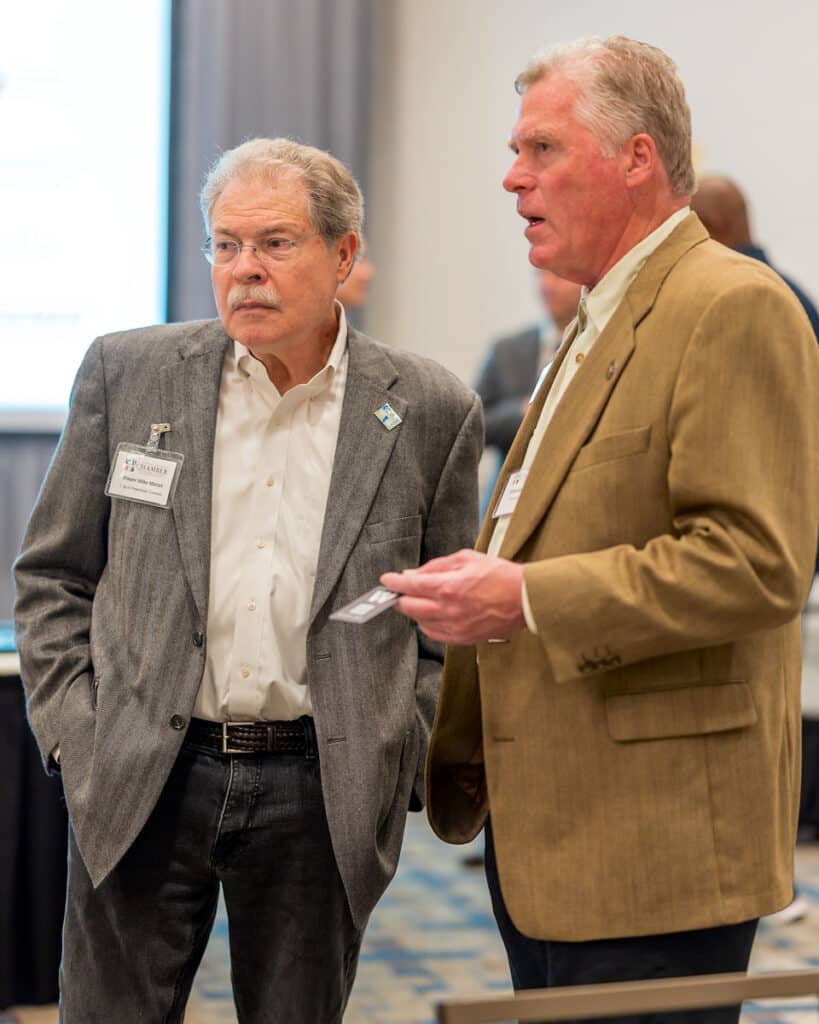
“Unfortunately, right now, we’ve got district attorneys and sheriffs across Georgia who are blatantly disregarding the law and letting folks back out on the streets who pose, you know, safety risks to law-abiding citizens like you and I and your businesses,” he continued.
Russel pointed out that there’s been a lot of criticism of this law.
“The ACLU was totally against it. Some felt like it was imprisoning poor people in the sense, for minor crimes,” he said.
“I do agree with the criticism for a few reasons,” said Romman.
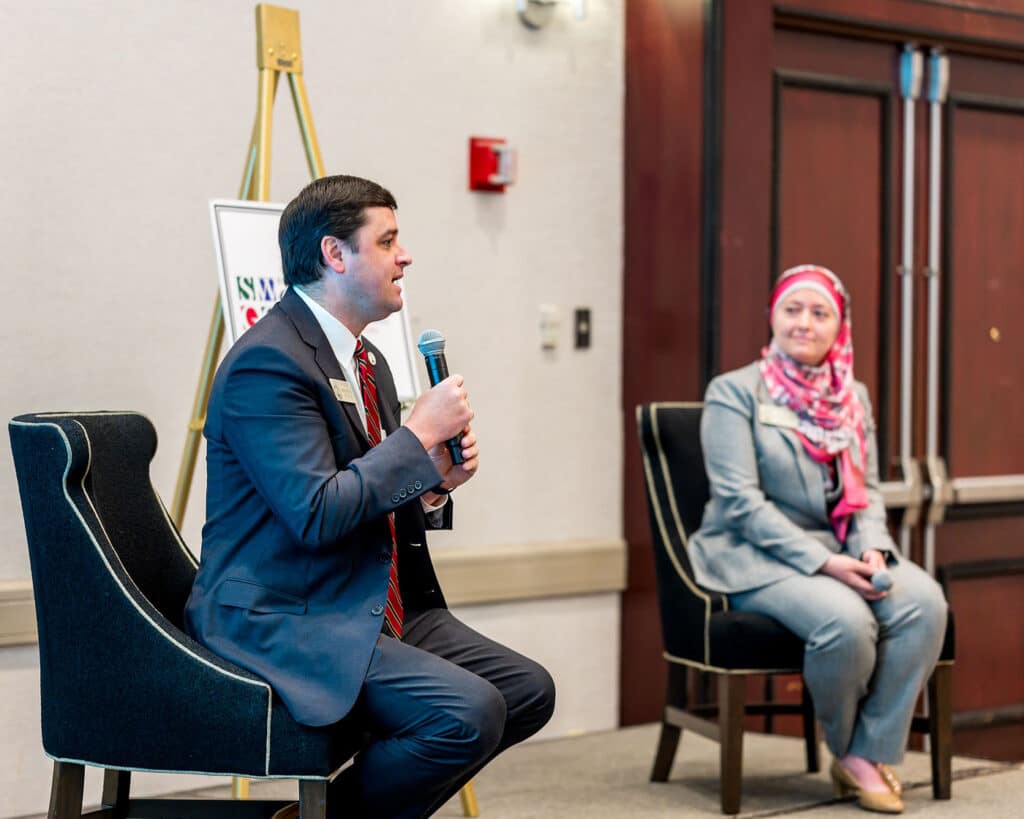
“The problem with this bill is that of the 30 crimes that are listed as now requiring a cash bail, the majority of them don’t actually require jail time, even if you’re found guilty of them. So now, somebody who would not even have ever served time for those crimes that are listed could now serve jail time because they cannot afford their bail,” she explained.
She added that the law doesn’t address the crimes it’s supposed to protect citizens from.
“We see these headlines, but this bill doesn’t address those because what we see happening is that a lot of churches now will no longer be able to bail people out that cannot afford their bail because of this bill,” she said.
“And churches that have been trying to, for example, reunite a parent with their children for Christmas, or whatever the case may be, can no longer do that. There is actually an exception written into this bill for bail bondsmen. So, it’s not like being able to pay cash bail is completely out of the question. It just means that somebody can make money off of it now,” Romman continued.
Hilton said the state isn’t done with addressing public safety issues as they come up.
“I know that’s been a priority of the governor, and I think rightfully so; you know, there’s a reason we’ve got citizens flocking to Georgia over the last ten years; we’ve added a million Georgians to our state, and they are leaving states with policies that don’t have this. They’re coming to Georgia for economic prosperity, for safety and for good schools,” said Hilton.
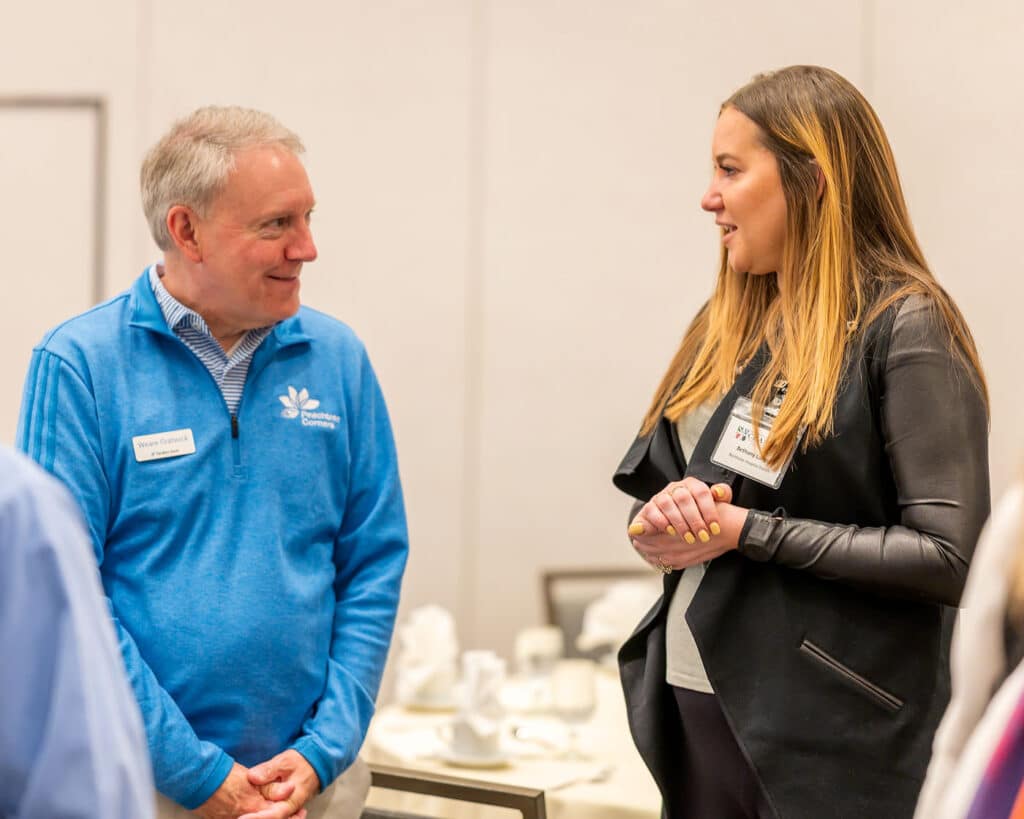
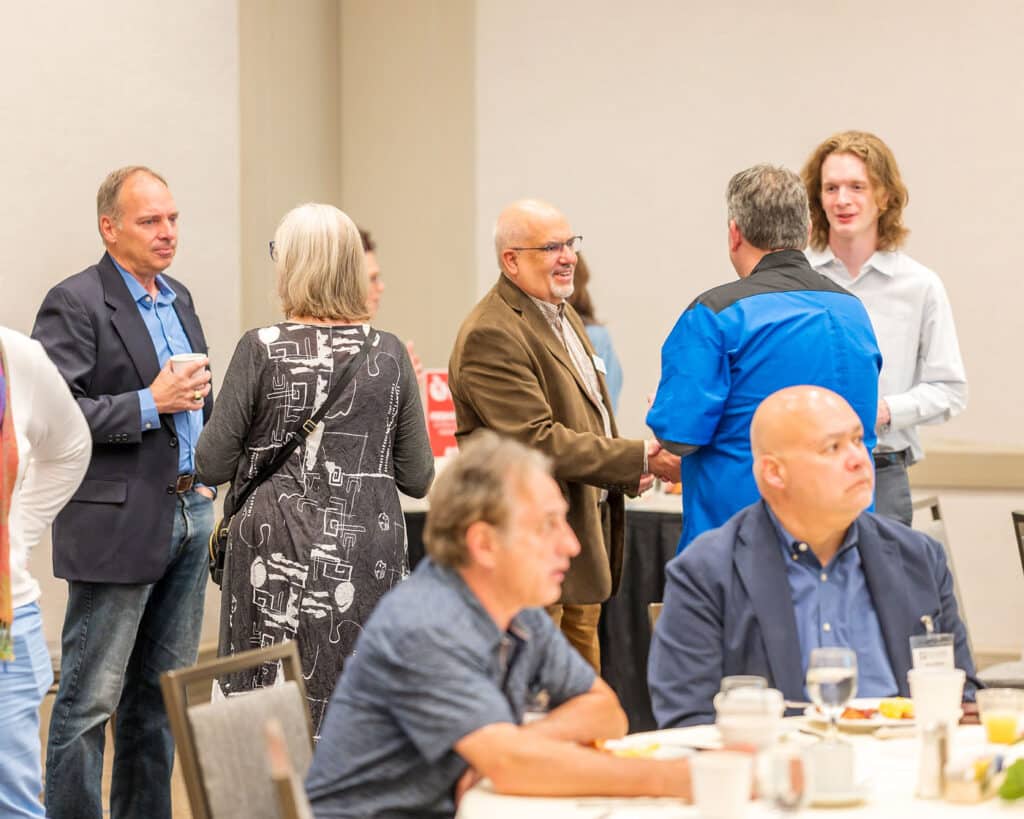
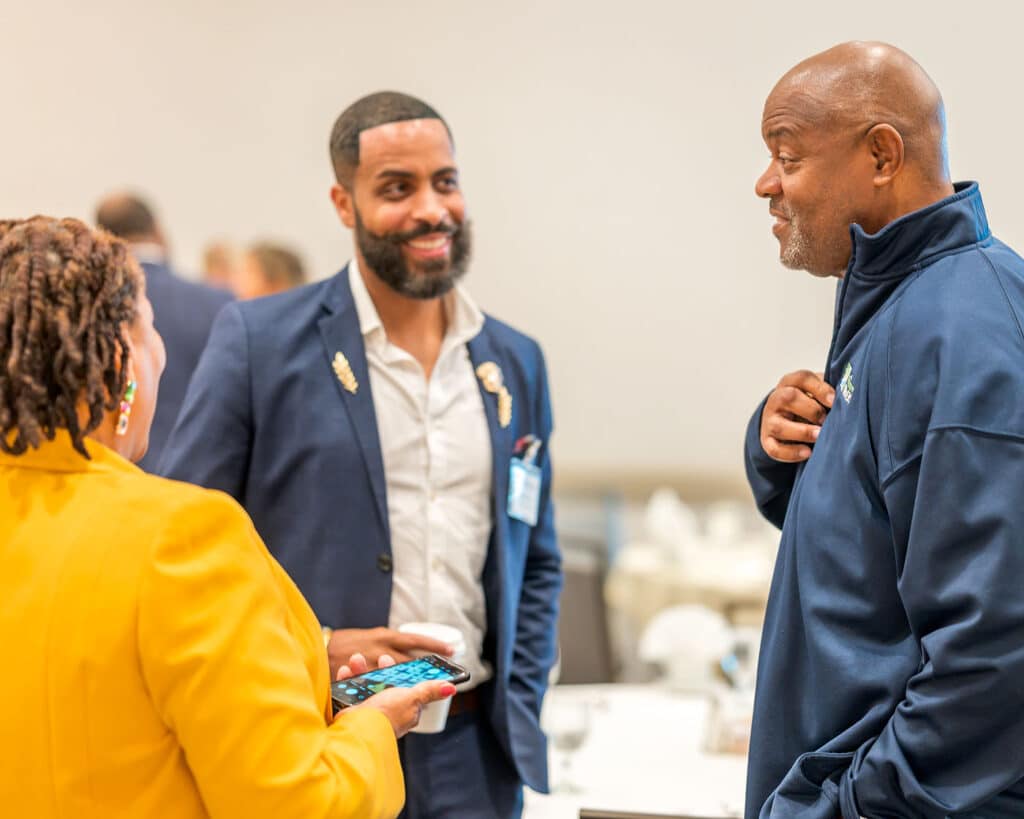
House Bill 1105
Another controversial bill, HB 1105, is framed as a public safety bill that requires local enforcement to coordinate with federal immigration officials when someone in custody is suspected of being in the country illegally.
Some say it’s an immigration bill.
“I know that the federal administration is trying to tell us there’s not a crisis. But there is a humanitarian crisis going on right now on our southern border. … But they’re not handling it the right way, and it’s starting to impact our communities,” said Hilton.
“We’ve got sheriffs who have folks in their custody, who [need] to be reported up to ICE. And essentially, they’re sort of ignoring what’s in the law right now that says you got to report these folks,” he explained.
Romman doesn’t see it that way.
“Again, when you read the contents of the bill, that is, unfortunately, not what it does,” she said. “I’m one of the few, if not the only, member of the legislature that’s done any border project work,” she remarked.
She talked about her work keeping unaccompanied immigrant minors safe.
“I want to remind people that when we talk about immigration, there’s an entire spectrum of people that we are talking about. And it’s not just at the border, it’s also people that fly into our country legally, that gets narrowed into a terrible immigration system,” Romman said.
“It forces our state and county and city police to do federal-level work without more funding. What we’re doing is we’re actually adding an increased burden, essentially onto their workload that we are not paying for. And in addition, within this bill, if they do not do this, they could lose more funding.”
She added that this will take the police away from focusing on local issues and trying to work with people who live in their communities.
“If a community member feels like if they reach out to police for help, and the police are going to deport them, they are less likely to report crimes and less likely to work with our local police department,” Romman said. “If we’re serious about immigration and its relationship to crime, immigrants are 30% less likely to commit crimes, and I don’t want to vilify an entire group of people.”
Romman said she supports a holistic, three-pronged approach that includes improving conditions on the border and pathways to citizenship.
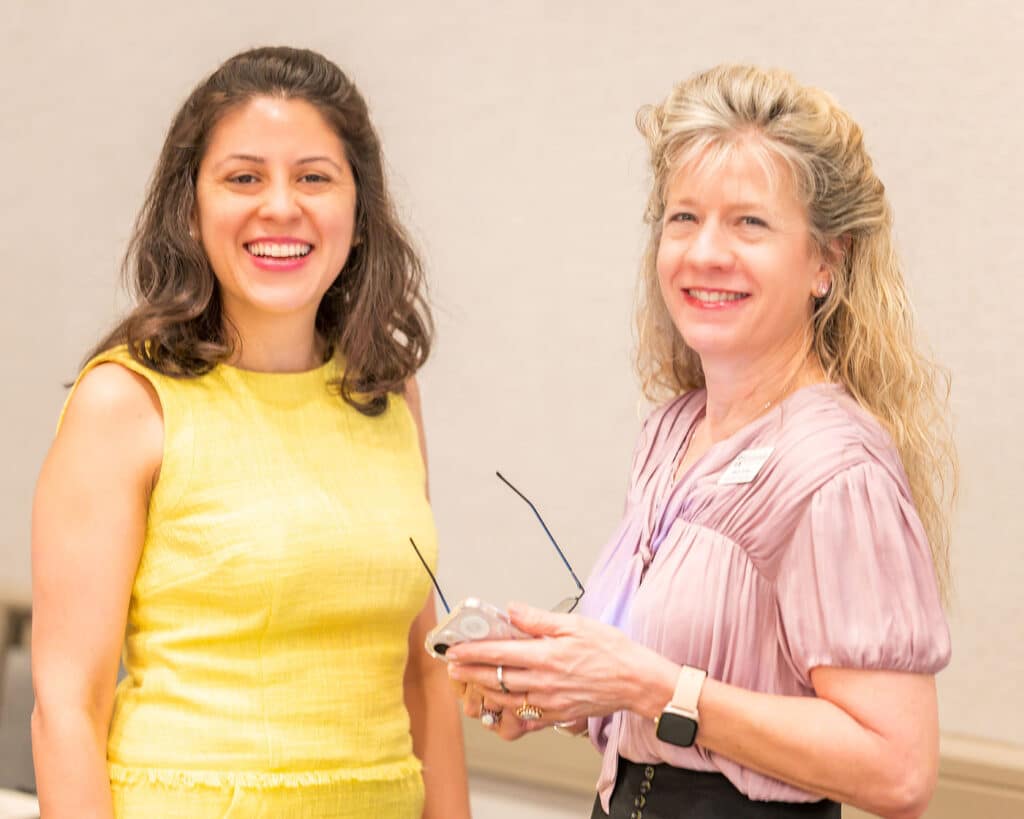
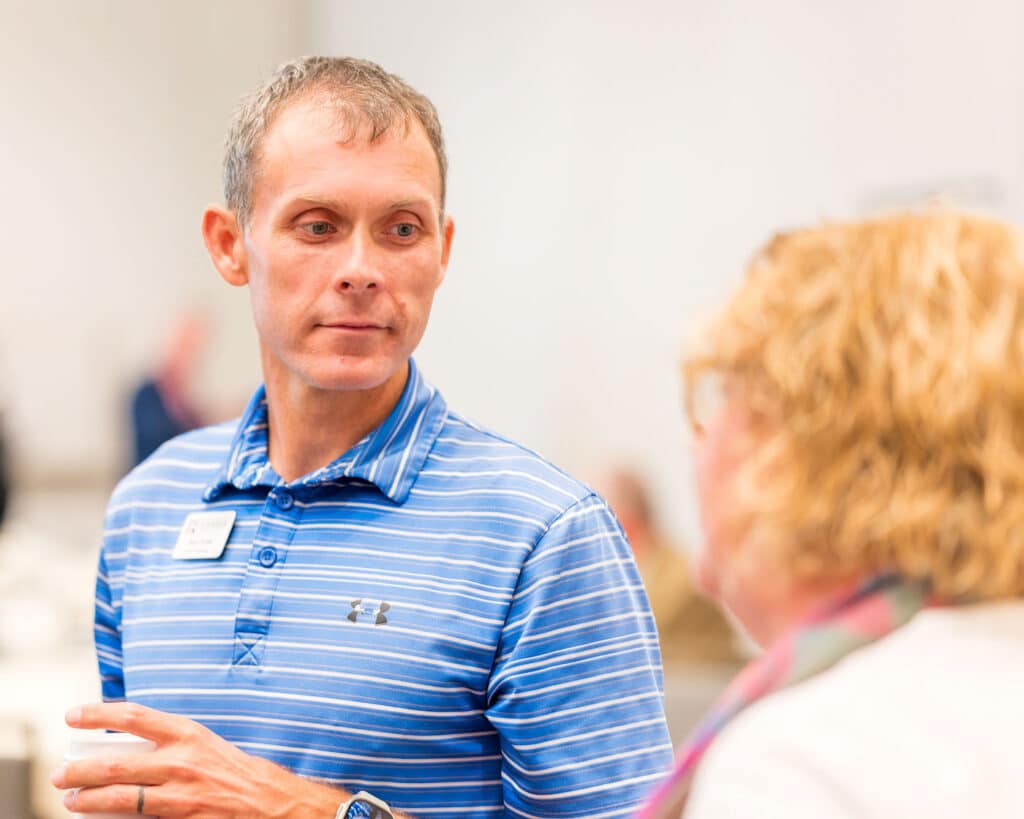
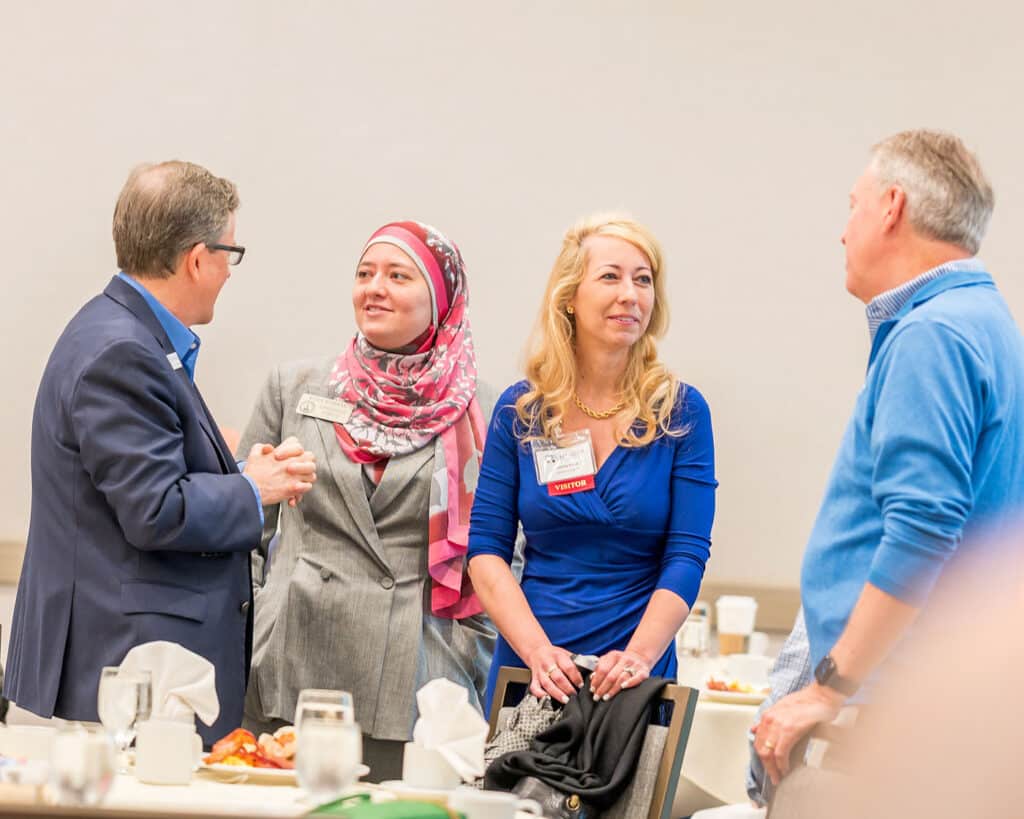
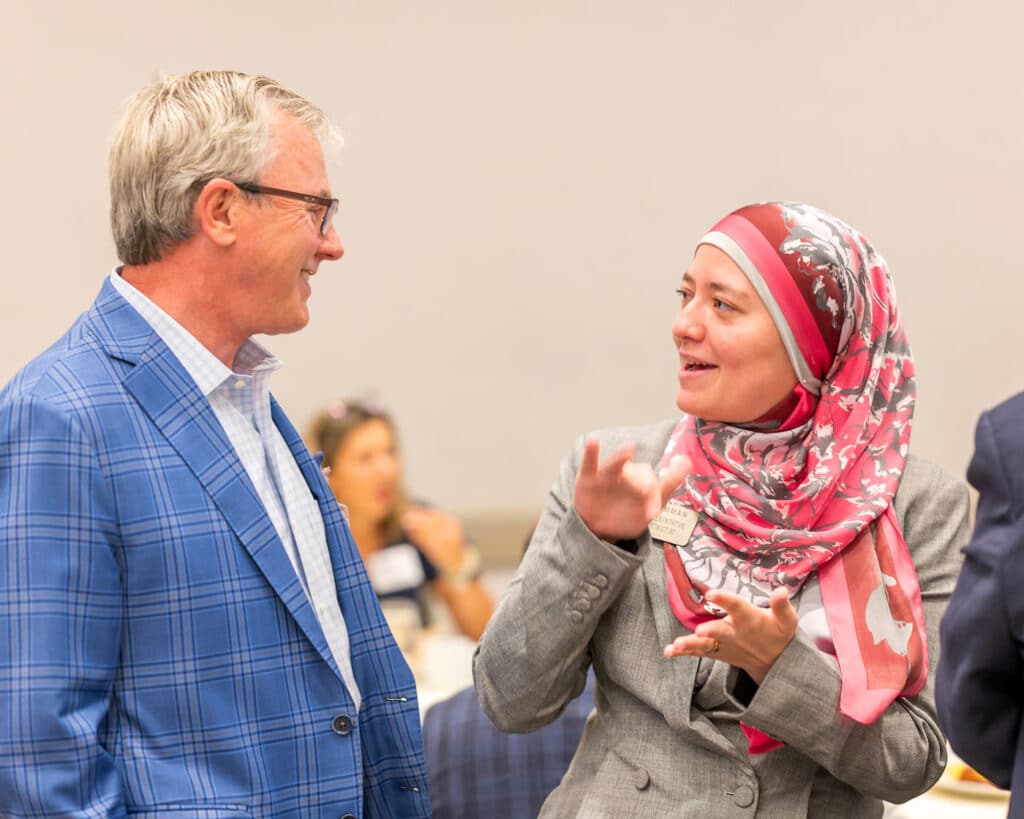
Business-related legislation
When the smoke cleared, both Hilton and Romman joked that they had different opinions about many issues but agreed that’s a healthy part of how the government works.
“The fact that we do disagree and the fact that you, the community, have varying choices and options out there. I think it’s a healthy part of the process,” said Hilton. “And we do have fun. I was telling somebody we play kickball about halfway through the session, and we do get along.”
The discussion moved on to topics such as the FTC ruling on non-compete clauses and tort reform, which just about everyone in the room agreed upon. Although employees could see the beauty of disallowing non-compete clauses, as business owners, they’d hate to see trade secrets put in jeopardy or valuable time and money put into training to benefit another company.
And everyone wanted to see caps on personal injury claims for things like slip-and-falls and fleet vehicle accidents.
“One of the few regrets I have coming out of session is that we didn’t do more on tort reform,” said Hilton. “Right now, Georgia is the number one judicial hellhole in the nation, meaning that we have more lawsuits on businesses and payouts than anywhere else in the country.”
This was one area where both representatives had similar views.
“I don’t think this is a left or right issue,” said Romman. “I want to make sure that whatever tort reform we pursue does not let, for example, a bad-acting company off the hook. But on the flip side, if somebody is just going around and suing everybody all the time to try and make some money off of it, how do you protect corporations and businesses from those kinds of bad incidents litigation?”
“What I will continue to look for when it comes to tort reform is, how are we going about balancing that?” she added.
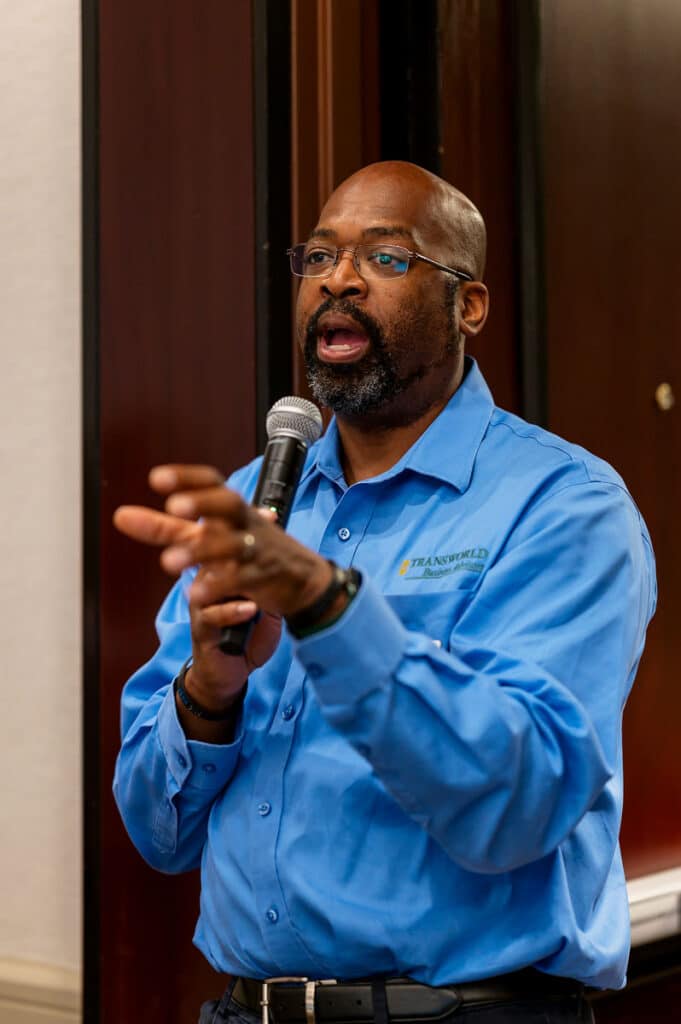
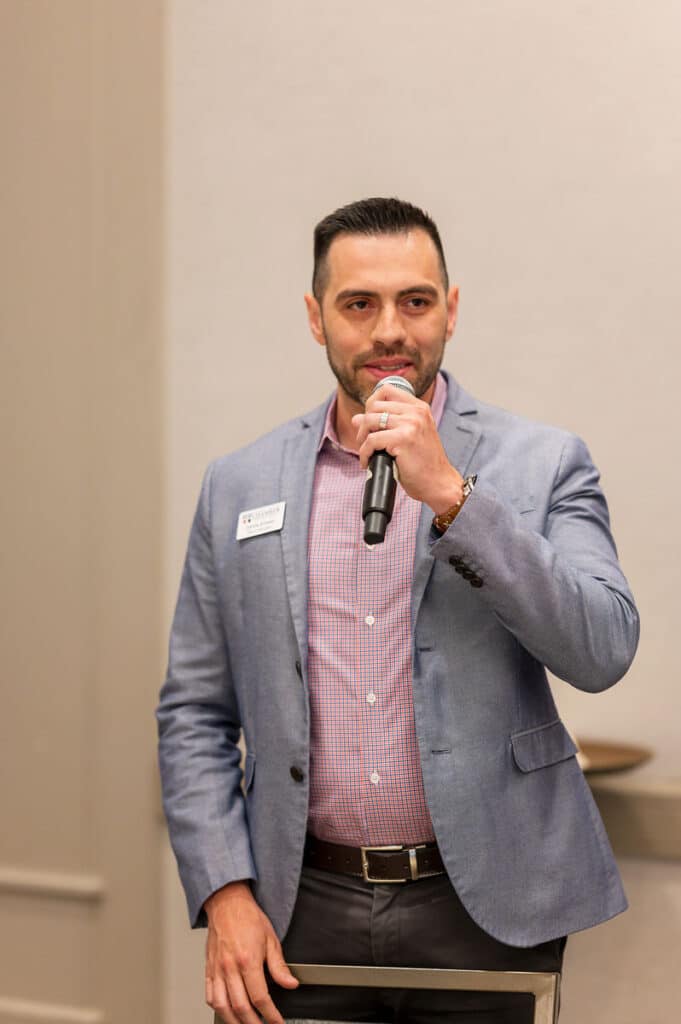
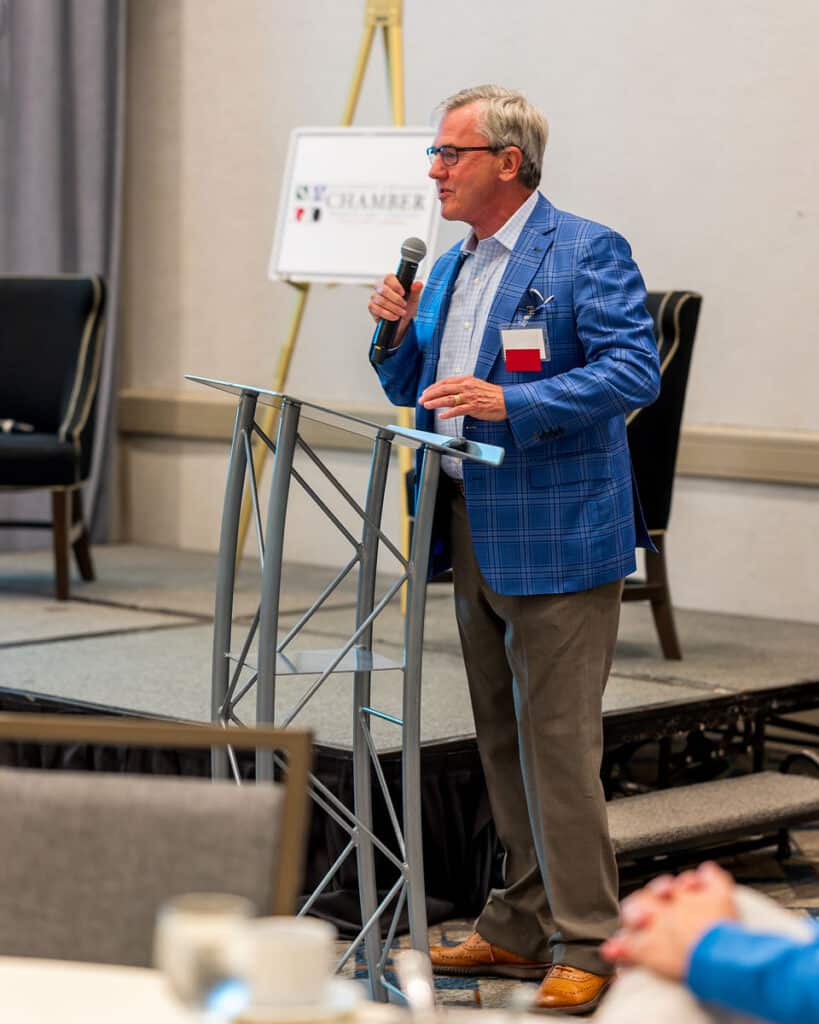
Looking ahead
As the session wrapped, Romman and Hilton pointed out legislation they’d like to see move forward next year.
“House Bill 971 creates a $300 tax credit for taxpayers who sign up for firearm safety training or purchase a safe storage device. It’s a bipartisan measure, viewed by some as a small but perhaps significant move for gun safety advocates, which was tabled in the Senate room,” said Romman.
She said the bill wouldn’t even require someone to disclose that they owned a firearm, but it was meant to incentivize people to store their firearms properly.
“There wasn’t a lot of appetite if somebody didn’t properly store their gun to have consequences for that, so we thought it would just incentivize better behavior,” she said.
Hilton mentioned school safety.
“Over the last three years, every single school in Georgia has gotten a one-time $100,000 grant for School Safety. That’s every school in Georgia; in this most recent budget, we included $45,000 in recurring money for every school in the state to do whatever they want to ensure their campuses are safe,” he said. This includes private schools as well.
At the end of the event, Hilton and Romman reminded the audience that they weren’t running against each other, and even though their views were different, their goals for a better Georgia were equally as passionate.
Related
Read the Digital Edition
Subscribe
Keep Up With Peachtree Corners News
Join our mailing list to receive the latest news and updates from our team.
You have Successfully Subscribed!

What’s going on at Jones Bridge Park and the Challenges of Urban Development

Taste of Peachtree Corners: PCBA Showcases Local Restaurants

The Forum Gives Sneak Peek of New Eateries and Community Spaces

Southwest Gwinnett Mayors Share Visions for the Future

8 Events Happening In and Around Peachtree Corners This August

Peachtree Corners Shines Bright with Light Up the Corners Glow Race this August

Peachtree Corners Shines Bright with Light Up the Corners Glow Race this August

The Forum Gives Sneak Peek of New Eateries and Community Spaces

8 Events Happening In and Around Peachtree Corners This August

Southwest Gwinnett Mayors Share Visions for the Future

Taste of Peachtree Corners: PCBA Showcases Local Restaurants

What’s going on at Jones Bridge Park and the Challenges of Urban Development

Local Resident Opens AtWork Location in Peachtree Corners

CHRIS 180 Expands its Services into Gwinnett County [Podcast]

Light up the Corners [Video]

Capitalist Sage: Business Leadership in Your Community [Podcast]

Cliff Bramble: A Culinary Adventure through Italy

Top 10 Brunch Places in Gwinnett County

A Hunger for Hospitality

THE CORNERS EPISODE 3 – BLAXICAN PART 1

Top 10 Indoor Things To Do This Winter

The ED Hour: What it takes to Remove Barriers from Education
Peachtree Corners Life
Topics and Categories
Trending
-
Business1 week ago
Taste of Peachtree Corners: PCBA Showcases Local Restaurants
-
Business2 days ago
The Forum Gives Sneak Peek of New Eateries and Community Spaces
-
City Government4 days ago
Southwest Gwinnett Mayors Share Visions for the Future
-
Around Atlanta4 days ago
8 Events Happening In and Around Peachtree Corners This August






